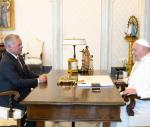You are here
A vote with ramifications
Mar 17,2014 - Last updated at Mar 17,2014
As expected, the greater majority of people in Crimea voted for unification with the Russian Federation in Sunday’s referendum.
Russian-speaking citizens in the Crimean peninsula constitute a thin majority of the entire population, and they naturally voted in favour of joining Russia.
There were no surprises therefore as far as the outcome of the voting is concerned.
By all accounts, Moscow’s bid to annex the territory was successful.
The Russian military was all over the area during the voting, which may have intimidated those voters who thought differently or had not made up their mind.
Strangely, voters were not given a choice between seceding from Ukraine and staying part of it. They were given the choice of joining Russia or having their own state. Maintaining Ukraine’s territorial integrity was not on the table.
The Russian Duma is projected to endorse the Crimean bid for unity, completing the process of bringing Crimea into the Russian fold. There will be no surprises here either.
Stranded in the middle of this “political mess” are the pro-Kiev Crimeans, including the Tatars who for the most part boycotted the polls altogether.
The outcome of the referendum remains an open question.
Moscow vetoed a UN Security Council draft resolution purporting to declare the referendum unlawful and calling on the international community and international organisations not to recognise it, but the fact that 13 Security Council members voted for the proposed resolution and Beijing abstained shows the extent of the opposition to Moscow’s move to annex Crimea.
The Chinese abstention is not without reason. Neither is its decision to break ranks with Moscow on the idea of holding a referendum on a secessionist move.
China is also a multiethnic, multiracial and multireligious country and it cannot be expected to agree with supporting separatist movements across the world.
The political fallout from the Crimean developments will no doubt damage East-West relations for a long time.
The EU has decided to impose punitive sanctions on Moscow and US President Barack Obama had warned Russian President Vladimir Putin that holding the referendum would entail heavy costs for his country.
The Washington-Moscow relations in particular might be heading to another Cold War era.
This would make the Russian success in Crimea bittersweet, while the international community will feel the fallout of the rising tensions between the major capitals of the world.













